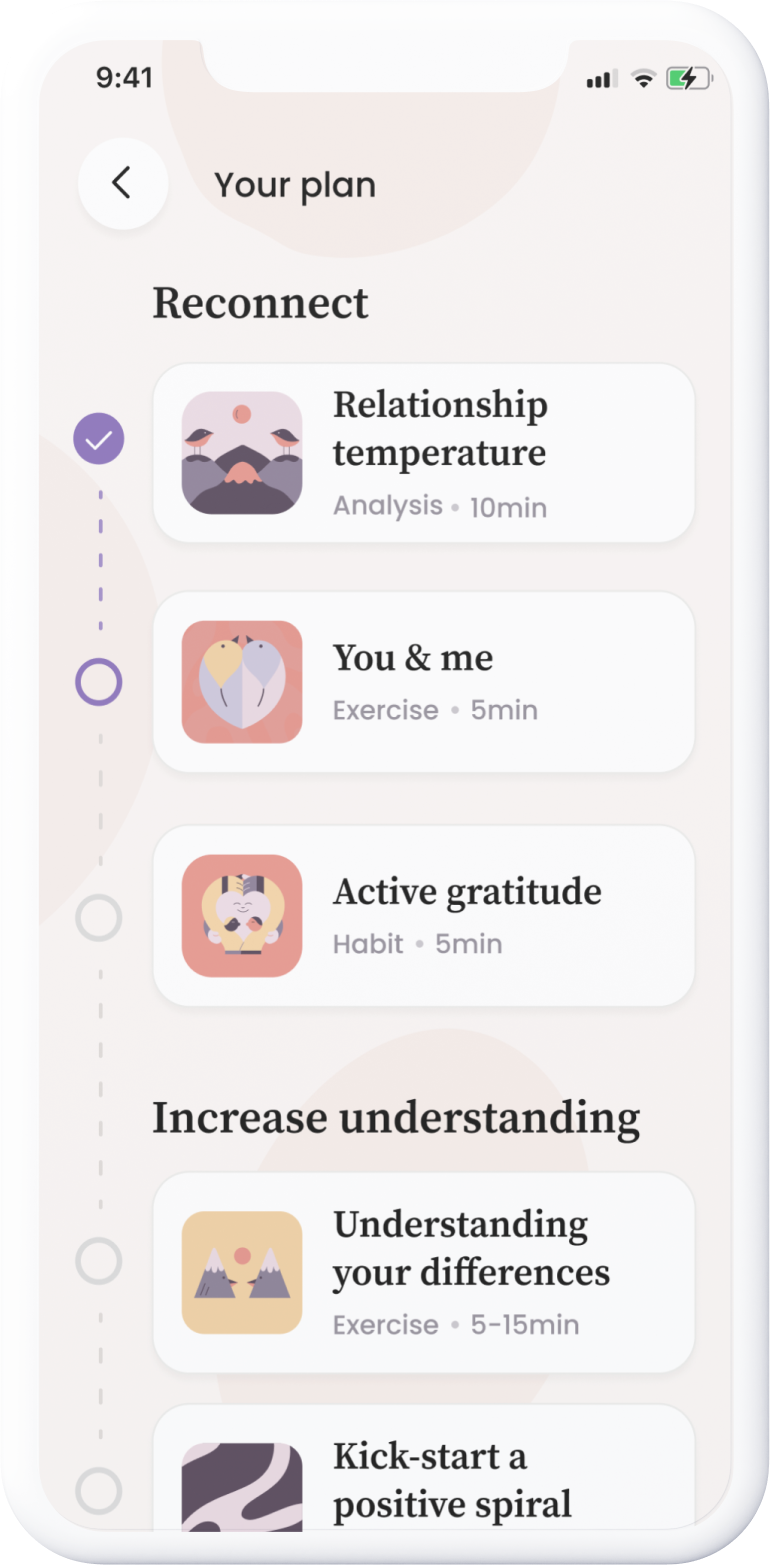
Do you miss intimacy in your relationship? Do you desire more physical contact, or is it rather the emotional closeness that you want?
A high degree of closeness and connection is something that characterises a happy romantic relationship for most people. However, it's common to feel less connected to your partner over time, or that the level of closeness fluctuates.
Do you have a relationship without intimacy? What is intimacy in relationships? And how can you increase the feeling of intimacy in your relationship? We'll explore these questions in this post.
Different types of intimacy in relationships
What does intimacy really mean? Intimacy is about feeling a close bond with each other, and it can be divided into different types. Firstly, there's physical intimacy, which involves actual touch: body contact, hugs, kisses, sex. Secondly, there's the more psychological and emotional intimacy, which involves sharing thoughts, feelings, and creating a deeper emotional connection. Often, these aspects are intertwined! For some, physical closeness is crucial to feeling emotional closeness. For others, it's important to feel seen, validated and listened to in order to even feel desire for sex.
Relationship without intimacy - how to increase it?
What do you do if you have no intimacy in your relationship? Is it possible to regain the feeling of closeness? How do you create physical and emotional closeness with your partner again?
It's common to feel that closeness and intimacy in relationships are missing, even when the love is still there at its core. "I know my partner loves me, but I don't feel it as strongly in everyday life," is something we as psychologists often hear. A lack of sufficient positive actions in the relationship can contribute to this. In the beginning of a relationship, we're excited and newly in love, doing everything we can to show how special and important our partner is.
For most people, this changes as the relationship becomes more established and everyday life takes precedence. The ratio between positive and neutral (or even negative) actions decreases. It's common with relationships without intimacy and also for fewer compliments to be exchanged with each other.
It's common and not necessarily a warning sign, but it's important to be aware of it not tipping towards a predominance of negative actions. In that case, you may actively need to work to reverse the trend.
The magic ratio for passion
Many are familiar with the idea that there should be a ratio of five positive actions to every negative one in a relationship, this ratio is sometimes referred to as the "magic ratio" or "5:1 ratio." It stems from the work of psychologist John Gottman, who conducted extensive research on marital stability and identified this ratio as a predictor of relationship success.
However, additional studies by John Gottman show that even more positive actions may be needed to continue feeling passion, intimacy, and strong closeness to each other. So for every time you respond negatively or are inattentive when your partner tries to tell you something, you need to offset it with 20 positive actions for your partner to continue feeling loved. And ultimately, this contributes to a greater mutual sense of closeness, attraction, and passion.
Increase intimacy through more positive actions
- Notice something your partner does that you appreciate. It's easy to start taking each other for granted when responsibilities are divided in a daily routine that just keeps rolling. Say "thank you for the meal" or "oh, thanks for taking out the trash!" even if you consider it obvious.
- Provide physical closeness in a way you know your partner likes. A hug, a stroke on the arm, a hand on the thigh. Small moments of touch during the day increase the chances of a longer massage session or a wonderful evening together.
- Give a genuine compliment. What qualities do you appreciate most about your partner? Do you think your partner is generous, loving, or funny - tell them! If you catch yourself thinking something nice about your partner, say it right away!
- Show that you think about your partner in everyday life. Buy their favourite bread, send an encouraging text before a work challenge, or plan an evening based on what you know your partner loves.
Spontaneous and responsive desire - does it affect intimacy in relationships?
We often have an idea that our desire for sex arises spontaneously, and that it then drives us to be sexually active. For some, it works that way. But for most of us humans, desire works differently in long-term relationships.
This is often described as spontaneous versus responsive desire. Responsive desire, unlike spontaneous desire, means that desire comes to life when we experience things that give us pleasure. It could be lying close to each other on the couch or being caressed by our partner. The more moments of pleasure we have, the more desire is created.
Research shows that it's more common for women to have responsive desires. But there are also many women with spontaneous desire and many men with responsive desire. How one's desire works can also vary over time. Many feel they had more spontaneous desire earlier in the relationship, and that's not unusual at all! During infatuation, hormones are released that make us more likely to experience spontaneous desire.
Exploring desire: Accelerators and brakes
You can see it as there being two different systems in the body that influence our sexual desire - the accelerator and the brake. Just as you simultaneously work with the accelerator and brake when driving a car, desire is also controlled by these two systems.
The accelerator works like this: your brain scans the environment for signals that it's time for sex. Anything that can be interpreted as a sign that you're ready is like pressing the gas pedal.
And the brake? Well, your brain also scans the environment for reasons not to get excited. It can be anything from fear to the anticipation of pain to the concern that your kids might hear you or walk in. Or that you're thinking about all the unwashed dishes, are completely exhausted, or don't feel comfortable in your body.
It's often more important to release the brakes than to press the accelerator pedal harder. Driving a car with the handbrake on is simply difficult, no matter how much you press the accelerator. Similarly, it doesn't help to just work with the accelerator when it comes to increasing intimacy in relationships. Your partner can do everything to get you going (ask what you like, create a romantic atmosphere, give compliments), but if the brakes are on, it'll still be difficult.
Releasing the brakes can be different for different people, which is why it's important to talk to each other about this. For many, it's about reducing stress in life, such as by relieving some household chores. Increasing warmth, closeness, and trust in the relationship is also a way to ease the brakes in a relationship without intimacy.








